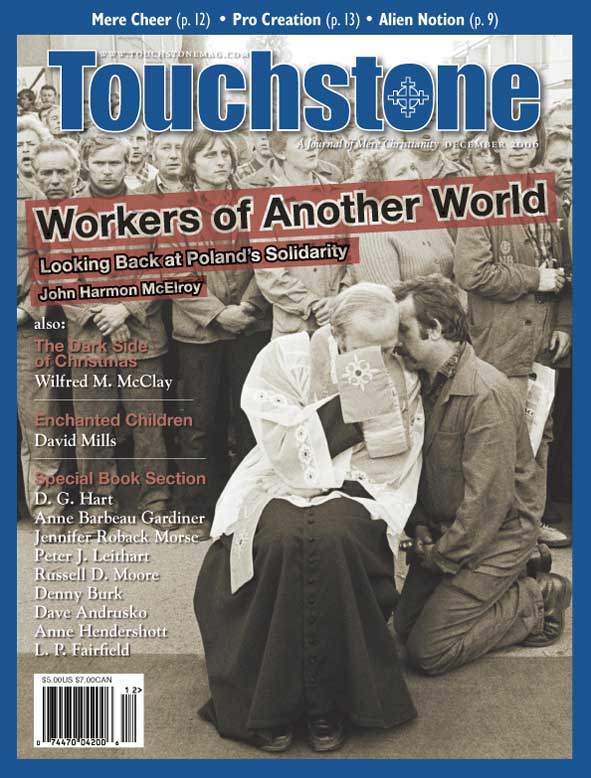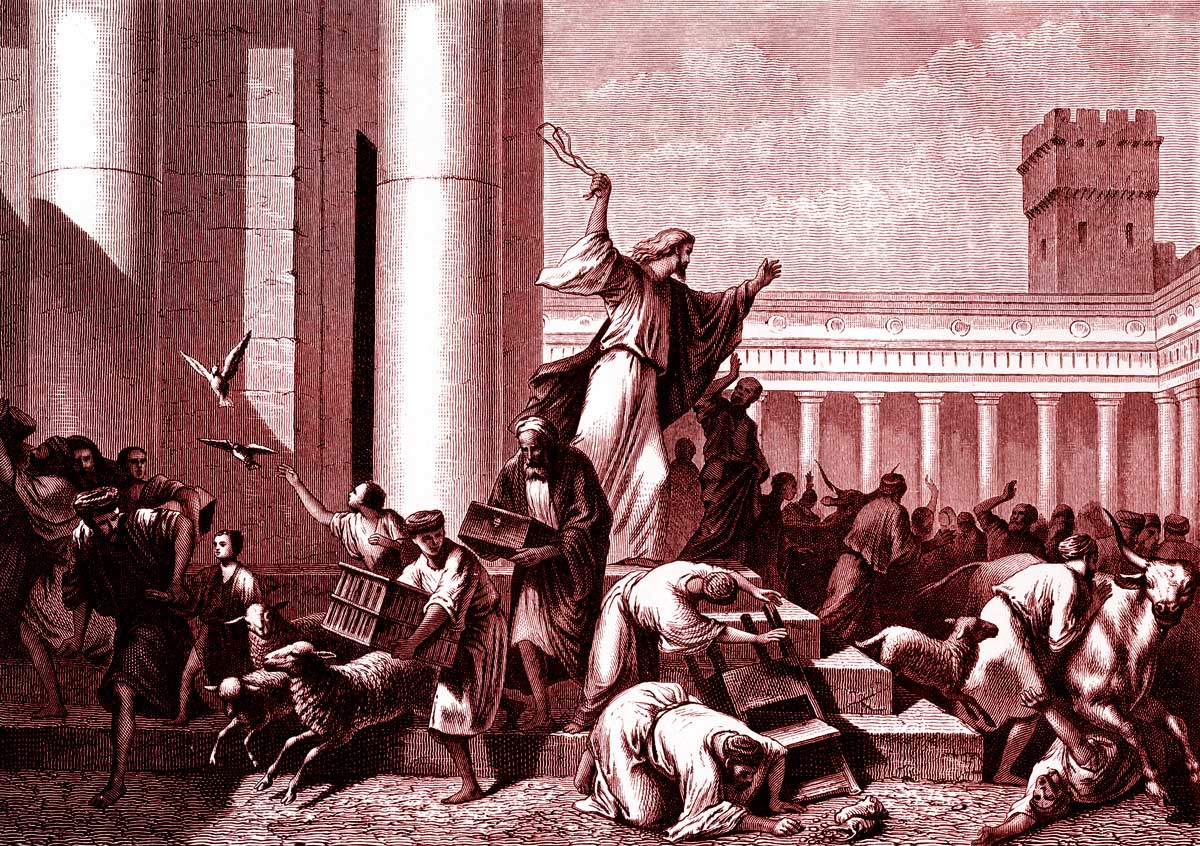Two Kingdoms Come
Toward An Evangelical Public Policy:
Strategies for the Health of the Nation
edited by Ronald J. Sider and Diane Knippers
Baker Books, 2005
(381 pages, $24.95, paperback)
The Scandal of the Evangelical Conscience:
Why Are Christians Living Just Like the Rest of the World?
by Ronald J. Sider
Baker Books, 2005
(140 pages, $12.99, paperback)
Evangelicals in the Public Square: Carl F. H. Henry, Abraham Kuyper, Francis
Schaeffer, John Howard Yoder:
Four Formative Voices on Political Thought and Action
by J. Budziszewsk
Baker Books, 2006
(218 pages, $19.99, paperback)
reviewed by D. G. Hart
The United States seems to make more sense divided than united. The Red State–Blue State analysis of the last two presidential elections is the most recent version of the abidingly useful method of splitting America in two. In the religious sphere, Evangelical Protestants are regarded as part of the conservative side in a two-party analysis of America’s political system, namely, as the religious right, and one of the Republican party’s core constituencies.
As the conservative party in American Protestantism, Evangelicals were the ones who weren’t supposed to be politically active. Applying religious teaching to public life was something liberals did through the Social Gospel (as opposed to Evangelicals’ individual gospel).
Evangelicals, believing that this world is only a temporary home, are supposed to be more concerned about the “end times,” which function as a marvelous incentive for evangelism and missions. In fact, the standard way to discredit Evangelicalism as little as three decades ago was to point out the movement’s political quietism.
And yet, as fast as it will take the Lord to return, Evangelicals became political junkies, even setting aside one entire Lord’s Day to raise a united voice not to the God who rules the universe but against judicial activism. Just as quickly they became a crucial piece of the Republican party’s electoral success. This image of an otherworldly soul animating a politically activist body is perplexing.
Individual Readings
The three books under review shed some light on the sources of this conundrum.
Toward an Evangelical Public Policy, edited by Ron Sider of the Evangelical left and Diane Knippers of the Evangelical right, is a collection of essays by Evangelical academics, church leaders, and activists that attempts to provide a theologically explicit rationale for the National Association of Evangelicals’ (NAE) new statement, “For the Health of the Nation” (also included in the book), on Evangelical participation in public life. Among the authors are Princeton’s Max L. Stackhouse, Yale’s Nicholas Wolterstorff, Fuller Seminary’s Glen H. Stassen, and the NAE’s Richard Cizik.
Ron Sider’s The Scandal of the Evangelical Conscience is a brief jeremiad against the hypocrisy of Evangelicals’ comfortable American existence (the author became famous with a book titled Rich Christians in an Age of Hunger) and a call to lead a life consistent with the transforming power of the gospel. “What a tragedy,” he writes, “for evangelicals to declare proudly that personal conversion and new birth in Christ are at the center of their faith and then to defy biblical moral standards by living almost as sinfully as their pagan neighbors.”
Both books are Evangelical in one very important sense. They depend heavily on the Bible and individual readings of Holy Writ, as opposed to political theory or general observations about the human condition. Born-again Protestants believe that for their views on politics and policy to be distinctively Christian, those convictions need to be derived from explicitly Christian teaching, whether from the Bible or from core Christian doctrines.
For instance, in a part of Toward an Evangelical Public Policy titled “Central Themes for an Evangelical Framework,” six authors address the topics of the sanctity of human life, care for the vulnerable, the family, stewardship, war and peace, and human rights. Four attempt to ground their arguments in the nature of the Trinity, the Incarnation, or the image of God in man. The other two bypass creedal affirmations and go straight to Scripture. In The Scandal of the Evangelical Conscience, Sider constantly invokes the Bible as his platform.
They also exhibit a typically Evangelical conception of the relationship between faith and holiness. Most of the authors appear to affirm the idea that the Christian must live a life markedly different from that of a non-Christian and that this difference must be evident in all walks of life. This is the motivation not only behind an “Evangelical public policy” but also behind “Christian ways” of “honoring God” in activities from aerobics and dating services to financial management and popular amusements.
Tested Truths
The Evangelical approach to politics is not necessarily troubling, since it reflects serious devotion. Nor does it eliminate redundancy or longwindedness. If every single policy requires a biblical-theological justification, the policy proposals themselves can receive short shrift because so many pages have already been devoted to theological reasoning. Since the NAE book devotes a whole section to theological considerations, why not confine the biblical and doctrinal reflection to those chapters and let the other authors move on to policy?
The answer appears to be that many Evangelicals are uneasy relying on the arguments of others, especially in the religious realm, where every truth needs to be tested against Scripture and settled by each writer. But the Protestant doctrine of sola scriptura was not meant to forestall the reception by Protestants of settled truths, such as the reflections and declarations (read: creeds) on biblical teaching by other saints, especially church officers.
Nor was it intended to be the basis for biblical approaches to all aspects of life, especially politics. The Westminster Divines, for instance, wrote that church assemblies were “to handle, or conclude nothing, but that which is ecclesiastical; and are not to intermeddle with civil affairs,” because Scripture contains not political theory but “that knowledge of God, and of his will, which is necessary for salvation.”
In other words, Protestants used to believe that the “light of nature,” as the Westminster Divines put it, was useful for figuring out those parts of life not explicitly having to do with salvation from sin and death. But contemporary Evangelical reflection on politics, if these books are any indication, is largely deaf to non-biblical sources, while finding explicitly political teaching in the Bible.
This may explain why the NAE book refers to Aristotle and Plato only twice, and closer to home, Abraham Kuyper once, and the same for James Madison, John Adams, Adam Smith, Alexis de Tocqueville, and John Rawls. One wonders if some Evangelicals are people of the book because they have little sense of the legitimate authority that resides outside the divinely sanctioned truths of Scripture.
But this problem may go deeper. Many Evangelicals do not appear to be able to recognize, following Augustine, that religion and politics operate in two different spheres of human existence, the former eternal, the latter temporal, and so have two different norms, with Scripture governing the spiritual (at least for Protestants) and general revelation guiding the political.
Misread Scriptures
If this conclusion sounds simplistic, readers should consult J. Budziszewski’s contribution to the discussion, Evangelicals in the Public Square. It is an extended brief for the importance of general revelation and natural law in political reflection and participation. Budziszewski does this primarily in a negative manner, by demonstrating the difficulties in the arguments of Carl Henry, Abraham Kuyper, Francis Schaeffer, and John Howard Yoder.
Budziszewski contends that each man relied more on special than on general revelation and in so doing ran the risk of reading his own political convictions into Scripture. The most obvious example of this difficulty for Budziszewski is Yoder, who construes the narrative of Jesus in radical and nonviolent ways to undermine Christ’s own teaching, as well as that of the rest of the New Testament, on the legitimate authority of the magistrate.
The defects in Henry, Kuyper, and Schaeffer, he argues, stem less from explicitly mishandling the Bible than from not recognizing the valuable resources for political reflection that come from general revelation. His implicit point is that the theological and redemptive teachings of Scripture have limited use for understanding political responsibilities.
All four theologians, Budziszewski argues, give up the language by which they could participate much more effectively in public debate. “Evangelical theologians,” he writes, “are somewhat reluctant to say much about [general revelation], not because they think it isn’t real . . . but because they fear saying much about it might detract from the more perfect revelation of the Bible.”
The danger is that Evangelicals have not recognized how much even the appropriation of special revelation is dependent on previously accepted truths from general revelation. The Bible, he writes, “takes it for granted that we know certain large truths even prior to its instruction, truths apart from which this instruction would be incomprehensible.”
Budziszewski, accordingly, offers ways that Evangelicals might improve their increasingly prominent role in American public life. If they continue to “bludgeon” their non-believing neighbors with proof-texts that are incomprehensible to non-Christians, Evangelicals will find their arguments about public life “less and less intelligible.”
Conversely, if Evangelicals can become more “sure-footed and sensible” in their engagement with the public square by greater use of general revelation and natural law, they may become more effective in public debates and possibly even bring non-believers to a point where they want to hear the truths of special revelation. Budziszewski aims not to formulate better policy but to improve public argumentation.
Budziszewski Challenged
This argument does not go unchallenged. Responses follow each of his chapters on Henry, Kuyper, Schaeffer, and Yoder, with the political philosopher Jean Bethke Elshtain offering concluding reflections on all the essays.
Each of the critics agrees with Budziszewski’s main contention about the limits of the four theologians’ views. But the responses also take issue with the basis for his critique. The most provocative come from William Edgar of Westminster Seminary and Ashley Woodiwiss of Wheaton College.
Edgar faults Budziszewski less for his reservations about Francis Schaeffer than for misunderstanding presuppositionalism, a form of apologetic that highlights an unbeliever’s insufficient grounds for making meaningful claims about the true, the good, and the beautiful. Here Edgar counters natural law with the Kuyperian notion of common grace. Grace, not human reason, is the only sufficient basis for believers pursuing projects in common with unbelievers because “the characteristic of unbelief is just that: to rebel against the truth, however it may come.”
Likewise, Woodiwiss disapproves of the author’s critique of Yoder because he believes that Budziszewski fails to see the genuine value of the Yoderian notion that the church “constitutes its own polis and in doing so reads and critiques the self-understandings, practices, and institutions of the modern polis.” Budziszewski, he argues, has misunderstood the inherently political character of the church.
If these responses are any indication, Budziszewski did not succeed in cracking through Evangelical Protestantism’s prioritizing of the supernatural over the natural, or the divine over the human approaches to public life. Whether they appeal first to the Bible, to grace, or to the church, Evangelicals have been habituated to regard the created order as an insufficient foundation for considering political authority, civic justice, and the common good.
Even Elshtain, a Lutheran, bolsters this proclivity by concurring with Hannah Arendt that forgiveness is “the greatest political contribution of Jesus of Nazareth.” No matter whether this assertion conflicts with an older Christian notion that the church’s task is to forgive, while the state’s is to punish evildoers, Elshtain apparently approves of the Evangelical conviction that the claims of special revelation apply to the state.
Indistinct Policies
A problem with Evangelical arguments about Christians having distinctly devout public policies is that their political practices almost never look so distinct. Judging by the proposals in the NAE’s statement For the Health of the Nation, Evangelical leaders appear to be increasingly humanitarian rather than conservative.
They are pro-life, compassionate, pro-family, concerned about the environment, opposed to unjust (if not all) warfare, insistent that the government provide a social safety net, uneasy about the death penalty, suspicious of business and supportive of limited government regulation, and advocates of human rights. But so are Roman Catholics and mainline Protestants, as well as Jews, Mormons, and many non-religious Americans who do not rely on the Bible or Christian doctrine for support.
The policies that Evangelicals are busily crafting are not unique to Evangelical sensibilities. Nor are they particularly biblical, but may actually reveal, as Budziszewski contends, the use of the Bible to baptize convictions derived from other sources of wisdom. And what if, as at the beginning of Christ and Culture H. Richard Niebuhr conceded may be the case, Christ’s teaching and the rest of the New Testament are silent about politics?
Whatever the answer to that question, one that the Evangelical contributors to these books seem willing to consider, For the Health of the Nation signals a significant shift among Evangelicals. Forty years ago, Evangelical leaders insisted that the responsibilities of the church and government were distinct, and that the church’s pre-eminent task was the conversion and care of souls. Now, however, the NAE confidently asserts that the church’s task is “to speak prophetically to society and work for the renewal and reform of its structures.”
The Evangelicals’ reputation in the worlds of higher education and journalism of being doormats for the GOP may explain their apparently new desire to adopt a progressive political program. But just as likely an explanation is the reality that Evangelicals have never been conversant with American conservatism, always willing to see moral ideals triumph over constitutional arrangements, legal considerations, and cultural habits.
The same moralism and urgency that today informs the religious right was also evident when nineteenth-century revivalist Protestants opposed slavery, alcohol, tobacco, Sabbath-desecration, and unhealthy diets, and provided the original constituency for the first iteration of the Republican party.
Other Than Republicans
In which case, if contemporary Evangelicals are interested in a political identity other than Republican, they might usefully consider either the Lutheran doctrine of the two kingdoms or the Reformed idea of the spirituality of the church. Both attempt to hold on to Augustine’s profound insight into the differences between the temporal and eternal aspects of human existence.
But this would require Evangelicals to remember that the church is called to proclaim the good news that makes us ready for the world to come, not to speak prophetically “for the renewal and reform” of this world. It would also mean a return in the case of the institutional churches to the political quietism for which twentieth-century Evangelicals were supposedly infamous prior to the election of Ronald Reagan.
Now that born-again Protestants both on the left and on the right have tasted the brew of political engagement, as bitter as the religious right’s recipe may be to some of them, they seem to be incapable of throwing away the bottle.
D. G. Hart works for the Intercollegiate Studies Institute (www.isi.org) and is an elder in the Orthodox Presbyterian Church. He is the author of A Studen't Guide to Religious Studies (ISI Books) and John Williamson Nevin: High Church Calvinist (P&R Books).
subscription options
Order
Print/Online Subscription

Get six issues (one year) of Touchstone PLUS full online access including pdf downloads for only $39.95. That's only $3.34 per month!
Order
Online Only
Subscription

Get a one-year full-access subscription to the Touchstone online archives for only $19.95. That's only $1.66 per month!
bulk subscriptions
Order Touchstone subscriptions in bulk and save $10 per sub! Each subscription includes 6 issues of Touchstone plus full online access to touchstonemag.com—including archives, videos, and pdf downloads of recent issues for only $29.95 each! Great for churches or study groups.
Transactions will be processed on a secure server.
more from the online archives
calling all readers
Please Donate
"There are magazines worth reading but few worth saving . . . Touchstone is just such a magazine."
—Alice von Hildebrand
"Here we do not concede one square millimeter of territory to falsehood, folly, contemporary sentimentality, or fashion. We speak the truth, and let God be our judge. . . . Touchstone is the one committedly Christian conservative journal."
—Anthony Esolen, Touchstone senior editor









